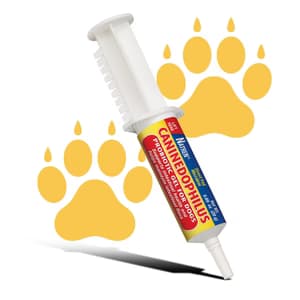Supporting your dog’s health isn’t just about walks and treats; it’s also about what happens inside their body. One often-overlooked area is gut health. Just like humans, dogs depend on a balanced digestive system to feel their best. That’s where probiotics for dogs become important.
Probiotics are beneficial bacteria that help maintain a healthy balance in the gut. They can improve digestion, reduce tummy troubles, and even support the immune system. Whether your dog is a tiny puppy or a wise senior, choosing the right probiotic can make a big difference.
Why Gut Health Matters for Dogs
The digestive system plays a huge role in your dog’s overall well-being. When things in the gut go off balance, due to illness, antibiotics, stress, or even changes in diet, your dog may experience diarrhoea, constipation, bloating, or loss of appetite. A well-balanced gut helps absorb nutrients from food and keeps harmful bacteria in check. Adding probiotics for dogs can be a gentle, natural way to support that balance.
Signs Your Dog Might Benefit from Probiotics
While all dogs can benefit from probiotics, some signs may suggest your pet needs extra support:
- Loose stools or frequent diarrhoea
- Gassiness or bloating
- Itching or skin irritation linked to food sensitivity
- Recent course of antibiotics
- Low energy or sluggish behaviour
- Irregular bowel movements
If your dog shows any of these symptoms, it’s worth considering adding a probiotic supplement to their routine, always with guidance from your vet.
Choosing the Right Probiotic for Dogs
Not all probiotics are created equal. Dogs have different digestive systems from humans, so it’s important to use formulas made specifically for canines. Look for a product that includes a variety of strains, such as Lactobacillus acidophilus, Bifidobacterium animalis, and Enterococcus faecium. These are commonly used in probiotics for dogs and are known to support digestive balance and immune health.
Also, check for a clear label showing the number of live cultures (measured in CFUs, colony-forming units). A good probiotic should offer a guaranteed number of CFUs until the expiry date, not just at the time of manufacture.
Avoid products filled with artificial flavouring or unnecessary fillers. Simpler is often better when it comes to dog supplements.
How to Give Probiotics to Dogs
Most probiotics for dogs come in one of three forms: chewable tablets, powders, or capsules. Some are even mixed into treats or dog food. The best choice depends on your dog’s preferences and how easy it is to give them supplements.
Powders can be sprinkled over food and are often the most flexible. Chewables may be easier for picky eaters if they taste good. Whichever option you select, ensure you follow the dosing instructions on the packaging and observe your dog’s reaction.
Everyday Benefits of Probiotics for Dogs
Dogs of all ages can benefit from having probiotics as part of their daily routine. Puppies can use the support while their immune systems and digestion are still developing. Adult dogs may need help adjusting to diet changes or stress from travel or boarding. Senior dogs often experience digestive slowdowns, so probiotics can help keep things moving smoothly.
Many dog owners have reported improvements in their pets' skin and coat after using probiotics. That’s because gut health is closely tied to inflammation, which can show up on the skin. A healthier gut typically results in less itching and fewer flare-ups.
There’s also growing evidence that a healthy gut may play a role in managing mood and behaviour. If your dog seems anxious or easily stressed, it may be worth looking into probiotics for dogs as part of a whole-body support approach.
Veterinary Insight and Caution
It's always wise to consult with your vet before starting any new supplement. Probiotics are generally safe, but it’s important to consider your dog’s individual needs. Dogs with chronic illnesses or those on medication might need a tailored plan.
Your vet can also help you choose a probiotic that matches your dog’s size, age, and health background. This ensures the supplement supports rather than interferes with their existing care routine.
Final Thoughts
When it comes to your dog’s well-being, small steps often lead to big changes. Supporting gut health through probiotics for dogs is a natural way to help them feel more energetic, digest better, and stay comfortable. Whether you're caring for a bouncy Labrador puppy or a quiet senior Dachshund, the right probiotic can be a valuable part of their wellness plan.
By choosing carefully, reading labels, and following a vet’s advice, you can make a choice that supports your dog’s health from the inside out, one bowl at a time.





Comments